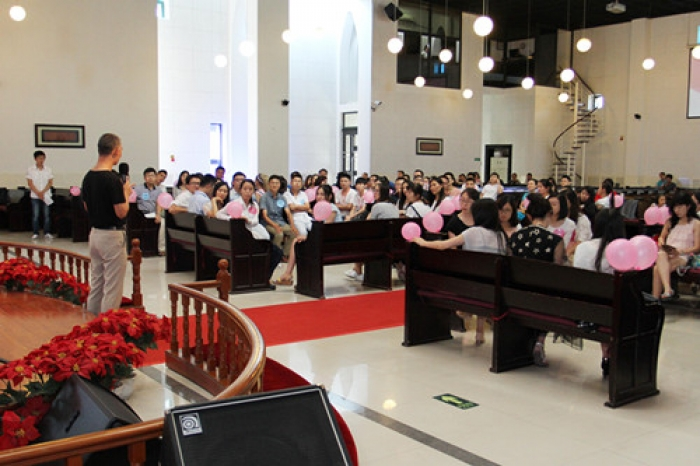An experienced pastor in relationship counseling has observed that the primary barrier preventing young people from forming intimate relationships is their inability to build and sustain such connections.
Brother Cui's relationship ministry operates in an ordinary building in central China. Starting from a psychological counseling practice, he has accumulated years of experience in the field. This year, he transitioned from individual marriage counseling to a new model of group relationship counseling, gradually seeing positive outcomes.
Through years of counseling, Cui has worked with many singles seeking guidance. He found that the statistical reasons, such as financial pressures and lack of time for dating, are just the "paper tigers" that prevent contemporary young people from forming intimate relationships. While the core of the issue remains unrevealed.
Like anyone else, singles naturally long to love and be loved, crave intimacy, and hope to find someone to rely on. However, the real obstacle roots in themselves. "Many singles fail to recognize the right ones even when they meet them, let alone know how to progress and deepen the relationship," he explained.
Therefore, the greatest challenge to entering an intimate relationship is the inability to build and develop such connections
Cui's solution is group relationship counseling.
He believes that such a counseling approach helps individuals gradually develop the ability to build intimate relationships. This approach goes beyond simply organizing social events for people to meet, providing theoretical courses, or following the strategies promoted by online relationship coaches who focus on superficial techniques.
At the core of Cui's ministry is a process in which each participant identifies and analyzes their personal challenges within a group setting, making adjustments and resolving issues through interaction. His priority is ensuring that real, lasting changes occur in their lives and that their relationship development skills improve.
Cui introduced that each counseling group session consists of 8 to 12 participants, with onsite sessions held every Sunday night. The program includes 12 sessions that must be attended consecutively in two months, and participation requires a fee.
"In our 12 courses, there is a theoretical study," Cui explained. "We introduce a topic, I lead the discussion, and then allow ample time for participants to share and engage."
"The topics we explore are often quite deep because the more in-depth the discussion, the more meaningful insights we can uncover. However, the central themes always revolve around 'relationship' and 'growth.'"
The most recent session focused on the theme of love. Cui shared, "In the church, love is frequently discussed, yet many people fail to recognize that love has boundaries, that is, love varies in degrees of closeness and distance. For instance, Jesus preached to large crowds, demonstrating love for all, yet he selected only 12 disciples for closer discipleship. He used parables when speaking to the broader group but spoke more directly to his disciples. Even within the 12, three were especially close to him, accompanying him to pray on the mountain before his crucifixion. But have you noticed that among those three, there was one whom he loved most?"
Cui further explored how the dynamics of love evolve throughout life. He explained, "The focus of love shifts at different life stages. In early childhood, a child's attention is entirely on their parents. This aligns with the concept of 'omnipotent narcissism,' as described by Wu Zhihong, a famous figure in China's psychology and counseling community, where a child's cries result in the immediate fulfillment of needs. As they grow, friendships become central; later, romantic relationships take precedence, gradually distancing friendships. Eventually, marriage represents the deepest union, followed by the addition of children, continuing the cycle of love."
"Healthy relationship development evolves with age, and the focus of one's love shifts over time. As participants explore these relationship patterns, they naturally begin to reflect on their stage in life, evaluating whether they are progressing toward healthy relational growth."
Another key component of the relationship counseling program is group activities, including outings, singing, photography, and cooking. These activities resemble those of typical dating and marriage events, aiming to encourage participants to express their true selves, experience everyday life, and adjust their emotional state within a team setting.
"For example, a child who was belittled and suppressed by their parents since childhood may struggle to accept praise as he/she grows up," Cui explained. "This is why participating in group activities is needed. Because in a group, people encounter different personalities and real interactions. It may point to an underlying personal issue if someone feels uncomfortable in certain situations."
"In general, the problems exposed within the group can be improved effectively after the session, for participants tend to adjust relatively quickly," he added.
Cui also noted that while the program fees are not high, they serve a critical function. "In the past, despite great efforts, there was little improvement. Now, we focus on helping those who are self-motivated. Charging acts as a form of screening. If someone is truly willing to change, they should be willing to invest in themselves. Since they've already paid, wouldn't they try to change when feeling uncomfortable?"
"Whether it's preparing discussion topics or planning activity content, it takes considerable time and energy," Cui acknowledged.
However, he noted with satisfaction, "We have just completed the first round of the program, and thanks to the team-based discussions, the safe environment, and the interactive atmosphere, some participants have already entered romantic relationships. The second round is ongoing, and one-third of the previous participants are willing to continue."
- Edited by Karen Luo, translated by Poppy Chan












